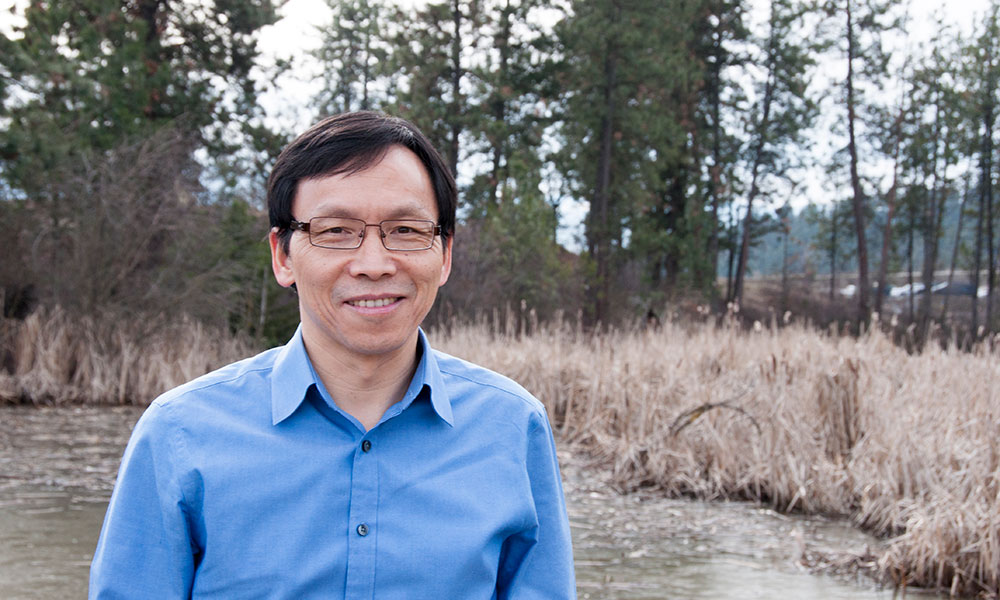Faculty Profile, People
Professor of forest hydrology Adam Wei takes his students into the living lab that is the Okanagan Valley
July 16, 2018

About
Name
Adam Wei
Role
Professor
Program
Freshwater Science
Faculty
Irving K. Barber School of Arts and Sciences
Campus
Okanagan (Kelowna, BC)
Education
PhD, Northeast Forestry University (China)
Hometown
Nanchang, China
“Forests play a vital role in sustaining water resources and aquatic ecosystems.”
TREES, WATER AND FISH. What is the significant connection?
For Adam Wei, they share an important relationship—an ecosystem perspective that is central to his research.
Born in Nanchang, the capital of Jiangxi Province in southeastern China, Wei is reminded by the living laboratory of interior British Columbia of his hometown’s surrounding geography.
Easy access to a remote alpine terrain, low-lying valleys, montane forests, interior scrubland, ephemeral creeks and large mainstream lakes that serve as the basis of Wei’s research, are what drew him to UBC’s Okanagan campus.
As an eco-hydrologist, Wei’s passion lies in sustainable management of forested watersheds, particularly interactions between forests, water and aquatic habitat.
“If we have a problem with forests, we’ll have a problem with water, such as droughts or floods, which will ultimately affect fish habitat,” he says. “We are linked by water quality and quantity. There are many processes, and if one fails, we will see an impact in the other. Understanding these connections allows us to manage the future of forests and water resources.”
COMMUNICATING CHANGES
In 2015, UBC Okanagan hosted the fourth annual International Conference on Forests and Water in a Changing Environment. As the conference chair, Wei, along with top scientists from around the world, gathered to talk about water availability, forestry and aquatic ecology and how they are affected by forest disturbance and climate change.
The conference, held once every three years, provides an opportunity for international scientists to share their research and exchange ideas. The goal is to provide a platform for experts who specialize in forest hydrology, eco-hydrology, geomorphology, watershed management, and climate change in forested environments to connect and share their knowledge.
“Forests play a vital role in sustaining water resources and aquatic ecosystems,” Wei says. “Forest disturbance, from natural events such as wildfire, insect infestation, disease, or even windstorms, and human-caused disturbance including timber harvesting and land conversion, can have a profound effect on hydrologic, geomorphic and ecologic processes.”
The conference attracted researchers from around the world. Over 200 delegates from more than 20 countries participated.
“I am so happy and grateful that this conference caught the attention of world-leading scientists. And more so, proud to have given participants the opportunity to see UBC Okanagan’s campus, as well as the opportunity to witness the effects of fire, insects, logging and other disturbances in the Okanagan Valley.”
EMPOWERING STUDENTS
Wei feels incredibly lucky to be a professor who teaches in the Earth and Environmental Sciences department and to work at an institution where he gets to focus on what he’s most passionate about. But beyond his research, working with students both on and off campus, and seeing the growth of the campus have been particularly memorable.
“As part of my upper-level courses, I offer students field trip opportunities to enhance their studies,” he says. “I find often, textbook concepts are better explained in the field. I’ll assign students various watershed projects where they’re required to collect and analyze data from a river site, submit a report, and present their findings. It’s an opportunity to develop multiple skills in a field that is so hands-on.
“It’s important to me to help develop students’ communication skills,” Wei adds. “Any student can write a research report, but being able to present and articulate their findings is a soft skill that I want my students to excel at, and to take into their future careers. It’s a skill that will set them apart.”
RESEARCHING FOREST ECOSYSTEMS
“Water availability and management is one of the greatest challenges facing the world this century,” says Wei, who is the principal investigator in a new four-year UBC study that will look at current forest management practices to determine how harvesting, and natural disturbances—such as wildfires and pest infestations—are affecting the natural balance between carbon and water.
“Understanding how forest management affects forest carbon and water resources is important for protecting ecological functions and for mitigating climate change impacts.”
UBC researchers are teaming up with Kelowna-based engineering and environmental consulting firm Ecora and the BC Ministry of Forests, Lands and Natural Resource Operations (FLNRO) to work on the project.
Forest ecosystems store about 86 per cent of the total global vegetation carbon budget. These carbon storage mechanisms have a substantial role in regulating the global carbon balance and directly impact other ecological systems, explains Wei. The UBC project will study the carbon/water relationship in reforested areas in BC’s southern interior region, but the findings can be scalable to any forest environment.
HANDS-ON STUDENT TRAINING
The research team includes Wei; Kelly Sherman, president of Ecora; Dr. Rita Winkler, senior forest hydrologist with FLNRO; three UBC Okanagan graduate students, and three undergraduate students. Wei will supervise students involved in the study while Sherman’s company will provide technical guidance on forest disturbance, reforestation, and forest carbon modelling processes. Winkler, who manages the Upper Penticton Watersheds, will ensure research sites and long-term data are available for the project.
“The research results will provide significant value to the natural resource management industry in Canada,” says Sherman.
“Partnering with UBC on this project means that students have access to hands-on training and technical skills in forest ecology and watershed science, and together we can create a knowledge base and educational resources that benefit students, industry, and all Canadians who rely on effective management of forest resources and watersheds.”
—by May Li with files
from Patty Wellborn